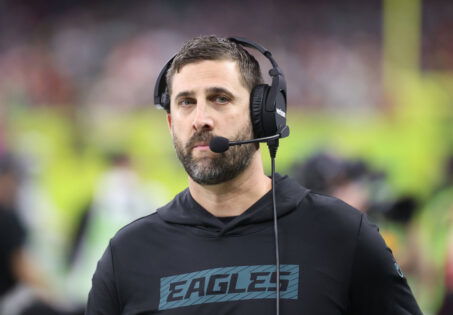There was a time, not all that long ago, when rookie contracts were a financial free-for-all. Without a wage scale to tether them, teams shelled out massive deals to top draft picks, often before they’d played a single down. The result? Disparities that stretched across the first round and beyond. It was all bloated guarantees here, bargain-bin deals there. That changed with the 2011 Collective Bargaining Agreement, which ushered in a structured pay scale designed to bring order to the chaos. And for the most part, it worked. But in a league built on margins, creative front offices still find room to maneuver. Once again, the Philadelphia Eagles appear to have found a loophole.
Their GM, Howie Roseman, who has often been credited as the mastermind of the Eagles’ success in recent times, has pulled off a masterstroke again. It was supposed to be just another regular rookie contract signing when the Eagles announced they had signed offensive tackle Cameron Williams to a 4-year contract. Given that Williams was a sixth-round pick, his contract was valued at $4.45 million. Sounds pretty normal, right? For a 6th-round pick, this is the contract structure that is generally followed.
However, Over The Cap columnist Jason Fitzgerald found something interesting. Considering his expertise in studying salary caps, Fitzgerald claims the Eagles engaged in some cap maneuvering with Williams’ contract. After conducting some research, he discovered that the Eagles have guaranteed $475,000 of his salary. This is huge, given that his rookie class normally receives $201,568 in guarantees. So, the total guaranteed amount Williams could receive stands at $676,568. Although this amount obviously appears significantly larger than it should be, the Eagles also chose to split the guaranteed money.
They are apparently paying Williams $375,000 in 2025 and $125,000 in 2026. Fitzgerald also notes that there is a small salary increase in his first two years of the rookie contract. And if you are wondering why the Eagles suddenly chose to split his salary, well, here’s the answer. Doing so brings down his salary if he ends up on a reserve list. The Eagles already knew they can’t rework a rookie contract until the 4th year. So, their opting for this strategy shows the precautions they are taking beforehand.
Anyway, the $375,000 the Eagles are paying Williams almost matches the salary of a practice squad player. This suggests that the $676,568 the Eagles are scheduled to pay Williams in total may not be significant in a few years. Moving forward, you shouldn’t be surprised if this practice becomes more widespread. The Eagles are adding more injury protection to their contracts, showing they don’t want to put any burden on their checkbooks. Either you perform or perish —that’s probably the strategy the Eagles are settling on.
However, this is not the first time their contract manoeuvring has been put on display. Roseman has been so effective in his contractual plays that even the league is now considering changing the salary cap rules.
Roger Goodell eyes crackdown on Howie Roseman’s cap schemes
Days after the league failed to ban Tush Push, the Eagles were presented with another potential setback. This time, though, the problems aren’t on the field. Instead, it’s aimed at their negotiation tactics. According to Ari Meirov of the 33rd Team, the NFL plans to hold lengthy discussions to verify the intended spirit of the current salary cap system. And probably determine whether any changes in the new CBA will be necessary. Well, the Eagles, as you know, are the current masters in structuring their players’ contracts. Take, for instance, Mekhi Becton last year. He was signed for a one-year deal worth only $5.5M.
However, Becton accounted for only $2 million on the Eagles’ salary cap. Then, once he moved to the Chargers, the Eagles were only hit with $3.5M in dead money. Suppose Becton had counted for his full $5.5M salary in 2024, he would have eaten up 2.2% of the Eagles’ salary cap. Instead, the $2 million accounted for only 0.8% of the Eagles’ total salary cap. Those $3.5M were converted into void years. With the rising salary cap in the whole league, the bulk of Becton’s salary cap charges were paid when the salary cap was higher. This made it easier for him to fit and also for the Eagles to leverage more financial freedom.
Repeating this process has helped the Eagles sign as many talented players as possible. Even Bengals QB Joe Burrow called out his ownership for not adopting the Eagles’ approach. “The Eagles are paying everybody. That seems like the way, whatever they’re doing,” Burrow said on the Pardon My Take podcast. Maybe after seeing how the Eagles are trying to change the way rookie contracts are designed, other NFL franchises could take some valuable notes and implement those themselves.
The post Eagles Make Unthinkable Contract Decision as NFL Scrutinizes Howie Roseman’s Cap Tactics appeared first on EssentiallySports.
